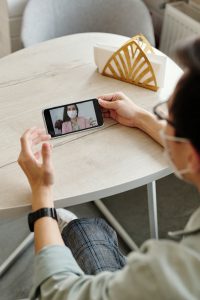1. One thing that helps

Your medical appointments over the last year were most likely to have been over the phone or video. Covid-19 hit healthcare systems hard and meant more people needed to turn to telehealth. For people who need regular visits to the doctor, this makes accurate diagnosis more difficult. A team led by the University of Washington is tapping into the power of your phone to make an online appointment just as effective as an in-person one.
They have developed a machine-learning system to assess your vital signs using only your smartphone’s camera. Based on your video, the algorithm will identify the important areas, namely the physiological areas of your face, and analyse the blood flow to get accurate pulse and respiration rates.
What’s more, the system is personalised so this machine-learning system will get more accurate the more you use it. Another great thing (especially if you are a privacy nut like me), the system doesn’t send your video to a server, it runs everything locally on your device.
Shwetak Patel from the UW team sums it up well. “Any ability to sense pulse or respiration rate remotely provides new opportunities for remote patient care and telemedicine. This could include self-care, follow-up care or triage, especially when someone doesn’t have convenient access to a clinic.”
2. One to be wary of
You may have seen the news last week that the data of 533 million Facebook users is circulating online. This includes phone numbers, email addresses and even physical addresses (seriously, who would put their actual address into Facebook!). But this article is not even about that. There is another serious privacy issue with Facebook data that is not getting much coverage.
The new way for dodgy characters to get your data is through an easy-to-use bot within the Telegram program. It allows whoever wants to pay, to uncover the phone numbers of anyone who has liked a particular Facebook page. The more likes a page has the more expensive they sell the data for. Whilst they actually give the data away for free if the page has under 100 likes, a page with tens of thousands of likes would cost a few hundred dollars. Chump-change for people who want to get their hands on your info.
Why should you be concerned? A combination of email address, birthday and phone numbers is enough to give hackers a big chance of hacking your account. Also, you will find yourself getting hassled by telemarketers on a regular basis.
With social media growing ever bigger, remember that the more personal information you put out there, the bigger the risk will be once vulnerabilities are exploited. Give the minimum away and force the platforms to justify why they need the data they are asking for.
3. One to amaze
It’s been a while since this newsletter checked in with Elon. Last Friday Musk’s Neuralink company posted this video of a monkey controlling the game Pong using just its mind.
By analysing the patterns of neural activity, and correlating these with the movements of the hand controlling the joystick, they are quickly able to predict what movements Paige the monkey would make. They then remove the joystick entirely and Paige gets to control the game with just her mind. Stick with the monotone voiceover in the video long enough to see the results – they really are fascinating.
We have talked several times about brain-to-computer interfaces in this newsletter, and as Neuralink’s page points out, their technology builds on decades of research. This kind of thing has been demonstrated before so what’s new in 2021?
For starters, Neuralink is wireless. Previous methods needed people to be tethered to the interface. Neuralink’s N1 Link is fully implanted into the brain and works wirelessly using Bluetooth, a technology so common that everyone knows how to use it. Then there’s the size. The N1 Link is teeny tiny, but despite its diminutive dimensions, it is powerful enough to transmit a lot of data thanks to its 1024 electrodes.
In recent years, we’ve seen mind-reading tech accelerate faster than ever and Neuralink’s demo is another huge step forward. What I want to know though is whether you would rather have Mark Zuckerberg knowing your thoughts (see edition 31) or Elon?